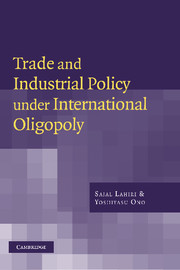Book contents
- Frontmatter
- Contents
- List of figures
- List of tables
- Preface
- Introduction
- 1 Cost asymmetry and industrial policy in a closed economy
- 2 R&D policy
- 3 Trade and industrial policy under foreign penetration
- 4 Trade and industrial policy under asymmetric oligopoly: a synthesis
- 5 Trade policy when producers and sellers differ
- 6 Foreign penetration in the presence of unemployment
- 7 Local content requirement and profit taxation
- 8 Export-oriented foreign direct investment
- 9 Lobbying for local content requirement
- 10 Foreign direct investment in the presence of cross-hauling
- Bibliography
- Index
7 - Local content requirement and profit taxation
Published online by Cambridge University Press: 22 September 2009
- Frontmatter
- Contents
- List of figures
- List of tables
- Preface
- Introduction
- 1 Cost asymmetry and industrial policy in a closed economy
- 2 R&D policy
- 3 Trade and industrial policy under foreign penetration
- 4 Trade and industrial policy under asymmetric oligopoly: a synthesis
- 5 Trade policy when producers and sellers differ
- 6 Foreign penetration in the presence of unemployment
- 7 Local content requirement and profit taxation
- 8 Export-oriented foreign direct investment
- 9 Lobbying for local content requirement
- 10 Foreign direct investment in the presence of cross-hauling
- Bibliography
- Index
Summary
Introduction
With rapid globalization of the world economy, increasingly many countries are encouraging inward foreign direct investment (FDI). In fact, one can say that ‘demand’ for FDI now significantly exceeds ‘supply’ of it. As a result, there is a fierce competition for foreign investment, whether direct or indirect, and in recent years a significant theoretical and empirical literature has developed on ‘tax competitions’: host countries using tax instruments to attract foreign investment (see, for example, Devereux and Griffith, 1996; Keen, 1991; Wildasin, 1989), although in the bulk of this literature foreign investment is of the portfolio type and is not FDI.
In chapter 6 we analysed the effect of restricting FDI on the host country's welfare when only one foreign firm takes part in FDI. By introducing free entry and exit of foreign firms to the model of chapter 6, this chapter considers the host country's optimal policies to attract FDI. There are many instruments that a host country government can use to encourage or discourage foreign firms, and to make the best use of the foreign firms. One of such instruments is to specify that at least a certain fraction of inputs should be bought in the local market. This restriction on the input use is called the local content requirement. A profit tax on foreign firms also affects their entry and exit.
- Type
- Chapter
- Information
- Trade and Industrial Policy under International Oligopoly , pp. 95 - 109Publisher: Cambridge University PressPrint publication year: 2003



